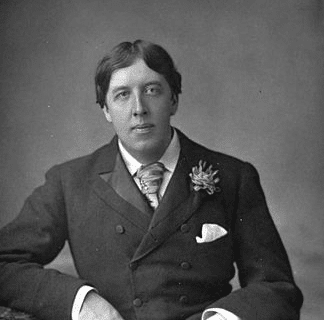
Oscar Fingal O’Flahertie Wills Wilde was born on October 16, 1854, in Dublin, Ireland, to Sir William Wilde, a renowned eye and ear surgeon, and Jane Francesca Elgee, a prominent writer and poet. Wilde was educated at home, until he was nine, by governesses who taught him French and German. From 1864 to 1871, Oscar attended Portora Royal School in Enniskillen, County Fermanagh. There he found friendship with classmates by entertaining them with humorous anecdotes and clever stories. Oscar Wilde excelled in academics at Portora, especially in classics and, on graduation, he was one of three students at that school to win a Royal School scholarship to major in classics at Trinity College, Dublin. He excelled in his studies at Trinity, graduating in 1874 at the top of the class and winning the Berkeley medal in Greek, Trinity’s highest academic award. He also won a scholarship to Magdalen College, Oxford, where he continued his study of classical literature, while developing a reputation for his wit and aesthetic sensibilities. He graduated from Magdalen College in 1878.
Wilde began his literary career in the early 1880’s when he published poems, essays, and lyrics that he had been writing for magazines since his entry into Trinity College. In 1884, he married Constance Lloyd, with whom he had two sons, Cyril and Vyvyan. His international fame began with the 1890 publication of his only novel, “The Picture of Dorian Gray,” that explored themes of vanity, hedonism, and moral corruption. Wilde’s wit and talent for satire were evident in his plays, including “The Importance of Being Earnest” (1895) and “An Ideal Husband” (1895).
Trials and Imprisonment:
Wilde’s career took a tragic turn when he was accused of homosexuality, that was illegal in Victorian England. In 1895, he was put on trial for “gross indecency” and sentenced to two years of hard labor. During his time in prison, he wrote “De Profundis,” a long letter to his former lover, Lord Alfred Douglas, which is a poignant reflection on his life and suffering. After his release from prison in 1897, Wilde lived in France under the name Sebastian Melmoth.
He wrote “The Ballad of Reading Gaol” (1898), a poem that expressed his experiences in prison and his concern for the inhumanity of the penal system. Oscar Wilde died of meningitis on November 30, 1900, in Paris, at the age of 46. However, his works continue to be widely read and performed today. His clever wit, flamboyant personality, and his contributions to the literary and cultural movements of the late 19th century made him an icon whose prescient insights continue to entertain those who attend theater in the 21st century.
Oscar Wilde lived his life as an individualist, choosing the lifestyle that fit his interest and was unencumbered by social norms. Expressing his libertarian point of view, he once observed, “Conformity is the last refuge of the unimaginative.” Reflecting on organized religion, he wrote, “Religion is like a blind man looking in a black room for a black cat that isn’t there, and finding it.”
